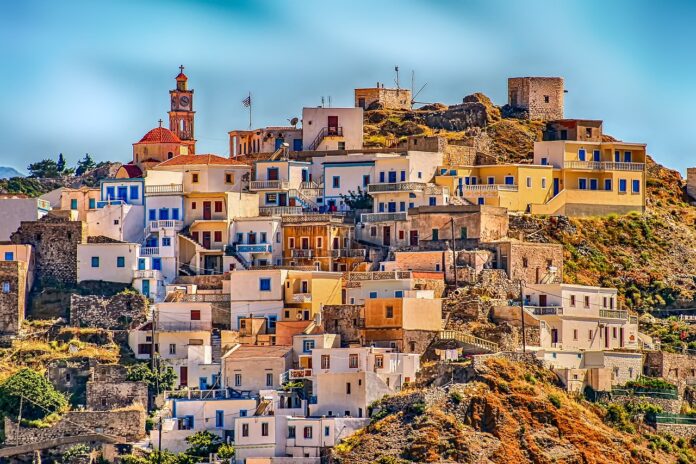23 Interesting Facts About Greece
- Location and Borders: Greece is located in Southeastern Europe, on the southern part of the Balkan Peninsula. It is bordered by Albania and North Macedonia to the north, Bulgaria to the northeast, and Turkey to the east. Greece also has coastlines along the Aegean Sea to the east, the Ionian Sea to the west, and the Mediterranean Sea to the south.
- Square: The country covers an area of approximately 131,957 square kilometers.
- National Currency: The currency of Greece is the Euro (EUR).
Interesting Facts About Greece:
- Wildlife Diversity: Greece boasts the highest number of wild animal species in Europe. It is home to 107 species of fish, 240 species of birds, 116 species of mammals, and 18 species of amphibians.
- Sunny Days: Greece enjoys over 250 sunny days a year, making it ideal for solar energy production.
- Daily Routine: Greeks typically wake up between 5 and 6 AM and go to bed after 11 PM, compensating for their lack of nighttime sleep with an afternoon nap (siesta) from 2 to 4 PM.
- Olive Production: Greece is a leading producer of olives and olive oil, with Crete and Peloponnesus being particularly renowned for their high-quality products.
- Valley of Butterflies: The island of Rhodes is famous for its Valley of Butterflies, where many butterfly species gather in groups during the summer.
- Clean Waters: The waters around Greece are remarkably clear, allowing visibility of sea life such as crabs on the seabed.
- Family Values: Greek society places a strong emphasis on family ties. It’s common to see large family gatherings of around 250 people. Elderly parents typically live with their daughters, and young people often stay with their parents until marriage.
- Mount Olympus: This iconic mountain, which reaches over 2,900 meters, is the highest in Greece and home to three of its tallest peaks. It’s also famed in Greek mythology as the abode of the gods.
- Mythical Creation: According to Greek mythology, the gods created the world by sifting the earth through a sieve, resulting in fertile lands for many countries and the rocky terrain of Greece.
- Tourism Industry: Despite having numerous industrial enterprises, more than half of the Greek population works in the tourism sector.
- Fur Trade: Even in its warm climate, Greece is a major hub for fur products, allowing tourists to combine their purchase with a luxurious vacation.
- Urban and Rural Living: Ninety percent of Greece’s land is covered by towns and villages, with houses typically being no taller than five stories.
- Gaming Ban: In 2002, Greece banned all games, including computer and gambling games, even in private homes. Although this law is now considered a violation of citizens’ rights and is generally not enforced.
- Public Transport: Greece has a well-developed public transportation system, with display boards at all stops showing the expected arrival times of the next bus.
- Mathematics Pioneers: Ancient Greeks are credited with inventing mathematics as a theoretical discipline.
- National Anthem: The modern Greek national anthem contains 158 verses.
- Migratory Birds: Each year, over 100,000 birds from Northern Europe and Asia spend the winter in Greece’s wetlands.
- Ancient Contributions: Greece is known for its ancient contributions to philosophy, drama, and the arts, with iconic figures like Socrates, Plato, and Aristotle shaping Western thought.
- Cultural Heritage: Greece is home to numerous UNESCO World Heritage Sites, including the Acropolis of Athens, the Meteora Monasteries, and the archaeological sites of Delphi and Olympia.
- Culinary Delights: Greek cuisine is famous for its delicious dishes such as moussaka, souvlaki, and baklava, and for its extensive use of fresh ingredients like olive oil, vegetables, and herbs.
- Greek Islands: Greece has over 6,000 islands, of which around 227 are inhabited, each offering its unique charm and beauty.
- Language and Alphabet: The Greek language and its alphabet have been influential in the development of many other languages and scripts, including the Latin and Cyrillic alphabets.
- Sporting Legacy: Greece is the birthplace of the Olympic Games, held in Olympia from the 8th century BC to the 4th century AD, and revived in Athens in 1896.
